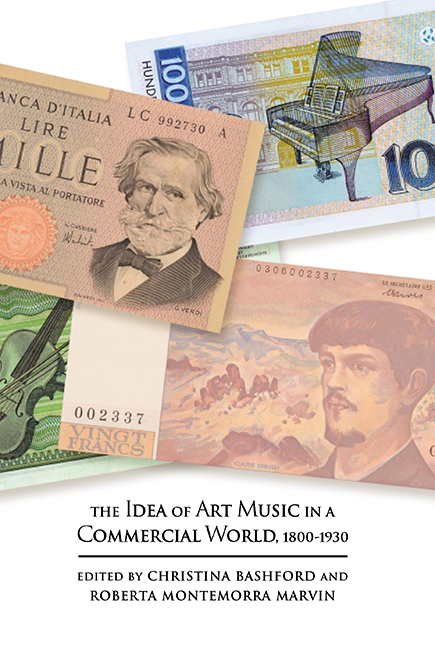Book contents
- Frontmatter
- Contents
- List of Figures
- List of Tables
- Notes on Contributors
- Acknowledgements
- A Note on Translations
- Bibliographic Abbreviations
- Introduction: The Idea of Art Music in a Commercial World
- PART I PUBLISHERS
- PART II PERSONALITIES
- PART III INSTRUMENTS
- PART IV REPERTOIRES
- PART V SETTINGS
- Index
- Music in Society and Culture
5 - A German in Paris: Richard Wagner and the Masking of Commodification
Published online by Cambridge University Press: 27 May 2021
- Frontmatter
- Contents
- List of Figures
- List of Tables
- Notes on Contributors
- Acknowledgements
- A Note on Translations
- Bibliographic Abbreviations
- Introduction: The Idea of Art Music in a Commercial World
- PART I PUBLISHERS
- PART II PERSONALITIES
- PART III INSTRUMENTS
- PART IV REPERTOIRES
- PART V SETTINGS
- Index
- Music in Society and Culture
Summary
IN one of his most famous essays about Richard Wagner, Ernst Bloch notes the ways in which Wagner's works are filled with paradox. For example, Beckmesser, the character in Die Meistersinger we are supposed to root against, has the most progressive music. Commenting on Beckmesser's corruption of Walther's Preislied text, Bloch remarks: ‘Much of it reminds one of what the philistine likes to call “degenerate”. […] It is presented with disdain by Wagner, and yet it is like a preview of Dadaism.’ Talking about the things that ‘surprise’ in Wagner, elsewhere Bloch writes:
we find right next to Walther's Prize Song […] nothing less than the music of Beckmesser […] above all the music for his pantomime […] which is one of the finest and most daring parts of the Mastersingers. […] It is significantly more ‘modern’ and is swimming significantly more against the traditional current than is Walther's Prize Song. This is a mistake from a dramaturgical angle, but musically it is a decided paradox.
In other words, Wagner, who billed himself as the progressive creator of the ‘artwork of the future’, casts his vote against Beckmesser, the character in the opera who is discursively the conservative but aesthetically the progressive. Hans Mayer echoes Bloch with similarly paradoxical examples from Wagner's biography: ‘With the late Wagner everything is still simultaneous: Young German enthusiast of a liberated sensuality and chaste knight of the Grail; destroyer of all bourgeois institutions and their beneficiary; Friend of Bakunin in unquenchable admiration and apparent friend of Ludwig II; denouncer of the ownership of palaces and lord of Wahnfried.’ Wagner had railed against animal cruelty when he saw a goose liver pâté for sale in a shop window, but then bought one as a birthday gift for his Bayreuth banker friend Friedrich Feustel.
A similar paradox seems to involve the ways in which Wagner responded to the newly changing circumstances of musical composition and performance in the early to mid nineteenth century. On the one hand, as I have argued in detail elsewhere, he marketed himself as a celebrity and branded his works as products that were in a category of their own; that is, under no circumstances were they ‘operas’ or to be referred to as such.
- Type
- Chapter
- Information
- The Idea of Art Music in a Commercial World, 1800-1930 , pp. 114 - 129Publisher: Boydell & BrewerPrint publication year: 2016
- 14
- Cited by



